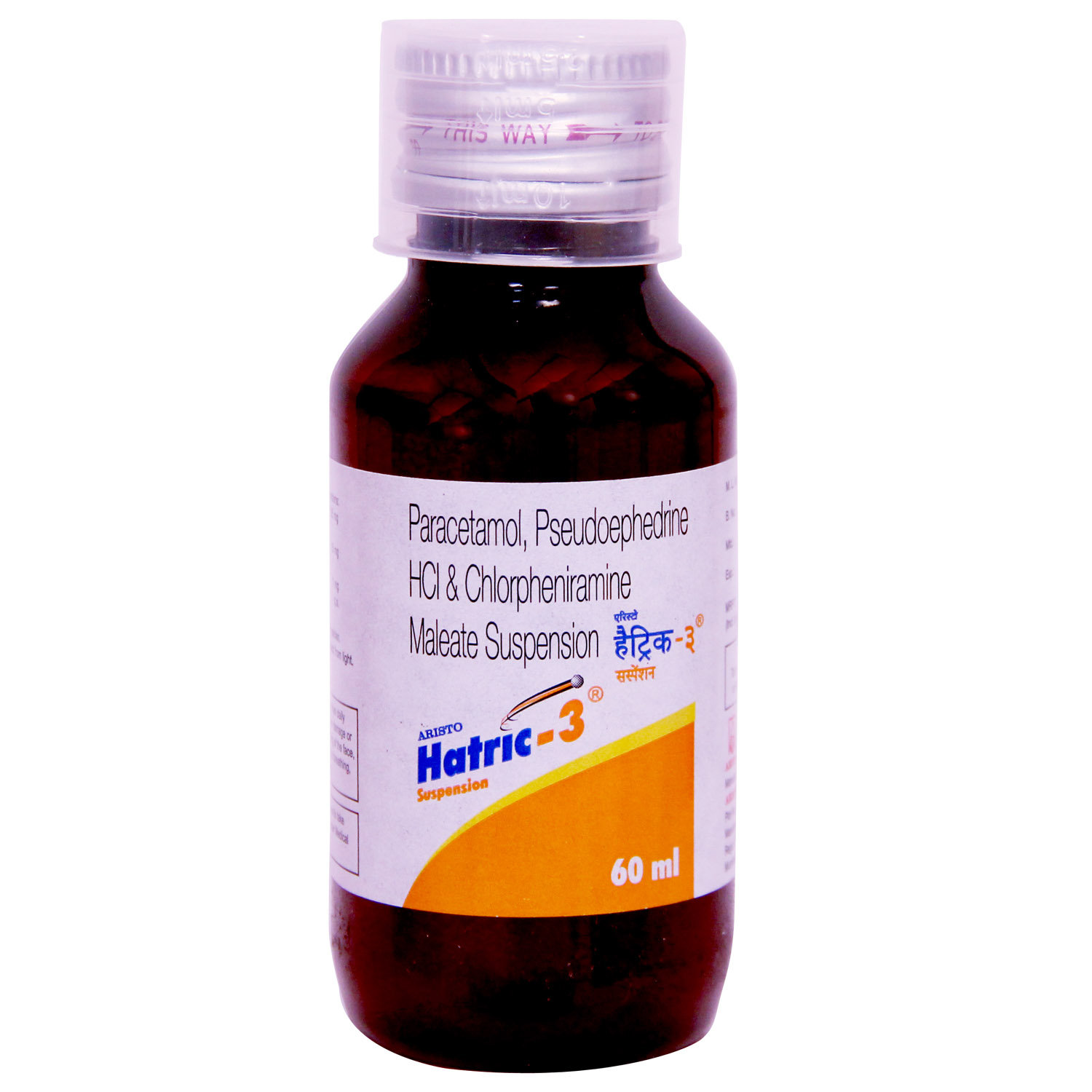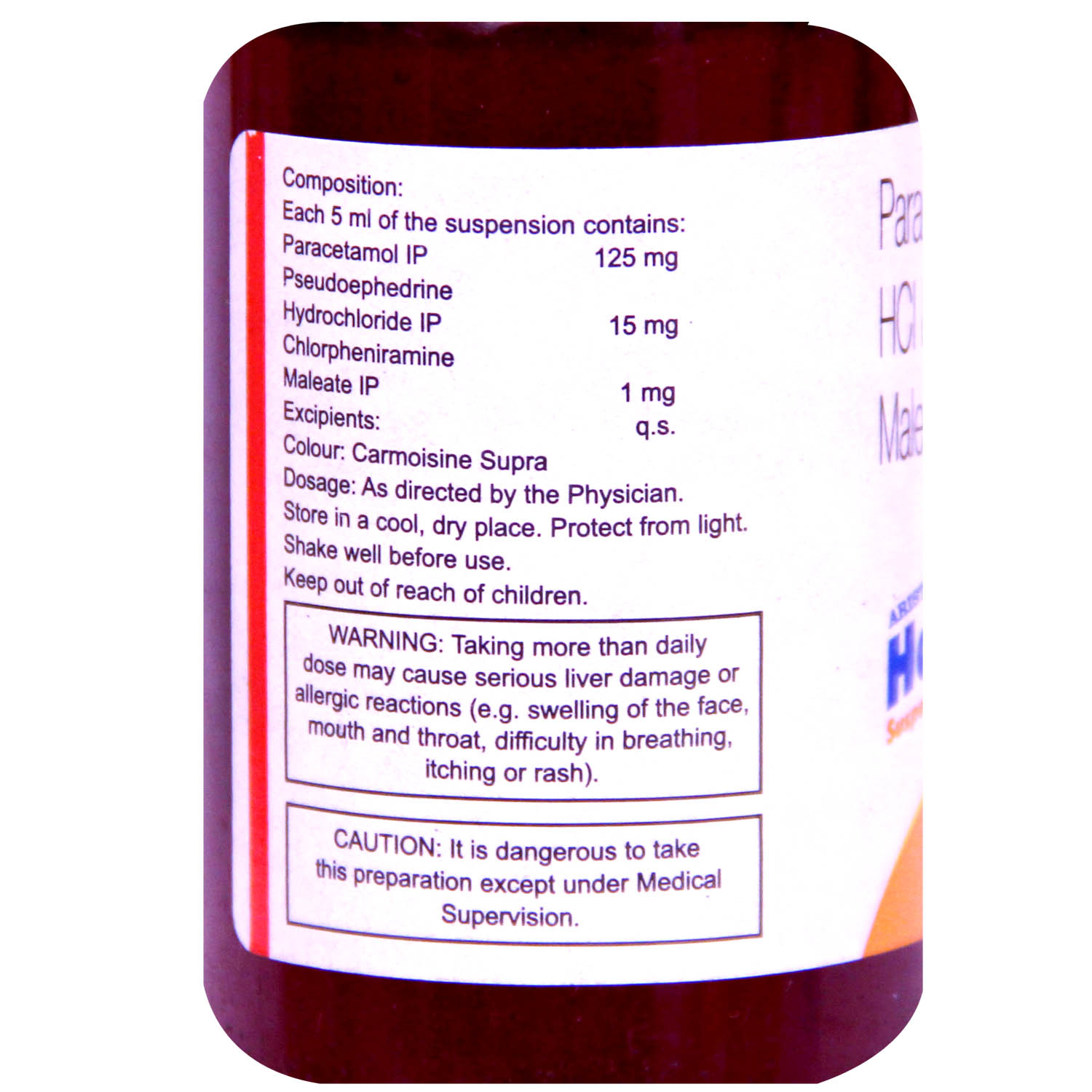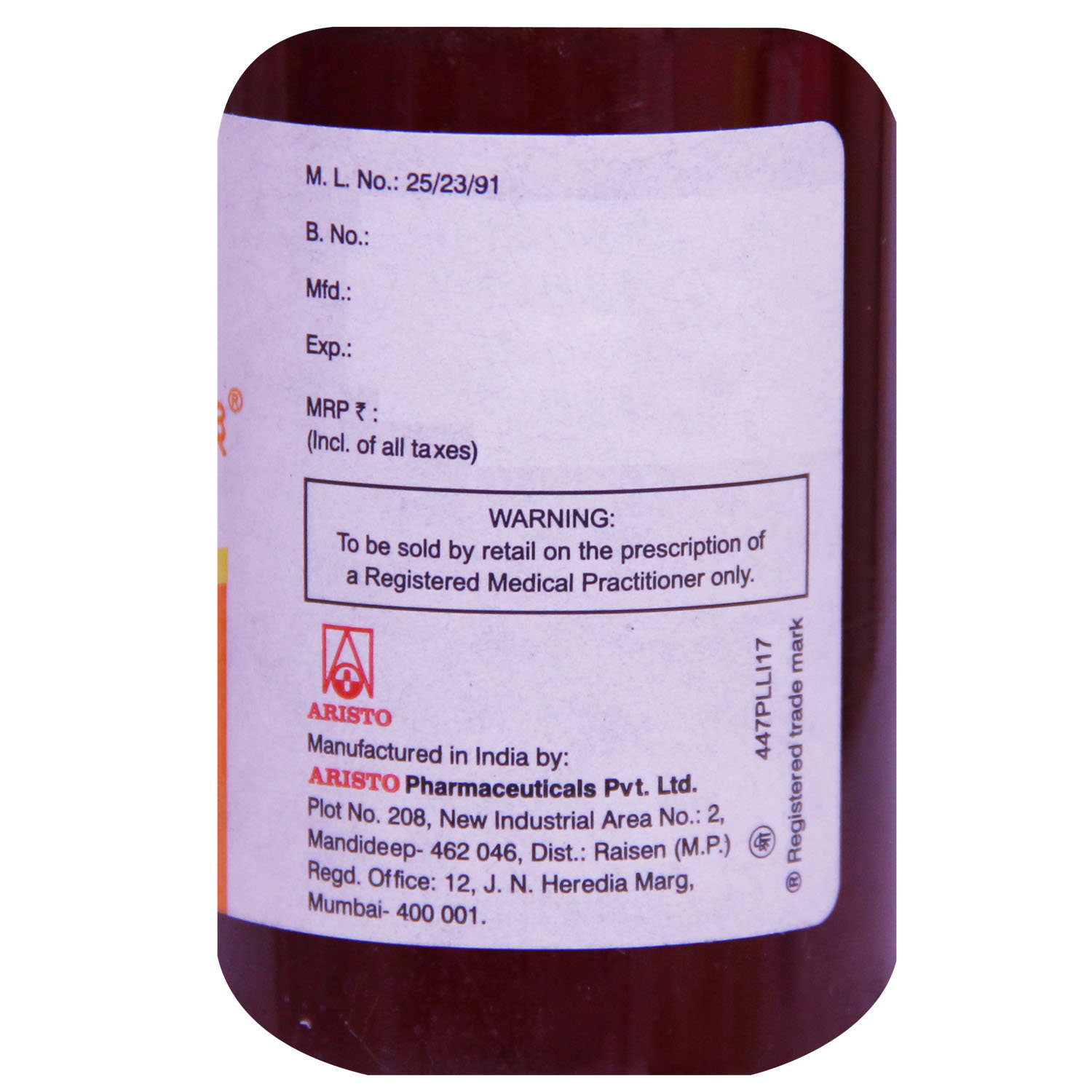Hatric 3 Suspension 60 ml
MRP ₹34.5
(Inclusive of all Taxes)
₹5.2 Cashback (15%)
Provide Delivery Location
Online payment accepted
 Prescription drug
Prescription drugWhats That
 26 people bought
26 people bought Manufacturer/Marketer :
Consume Type :
Expires on or after :
Return Policy :
About Hatric 3 Suspension
Hatric 3 Suspension belongs to the class of medication called 'cough and cold medications' primarily used to treat symptoms of the common cold and allergies like sneezing, runny/stuffy nose, fever, headache, body pains, congestion or watery eyes. The common cold is a respiratory illness affecting the nose and throat. It is mostly caused by viruses known as 'rhinovirus'. The virus enters the body through the nose, mouth or eyes and spreads easily through droplets in the air when the person who is sick sneezes, coughs or talks.
Hatric 3 Suspension is a combination medicine that contains Paracetamol (mild analgesic and antipyretic), Pseudoephedrine (decongestant), and Chlorpheniramine (antihistamine/antiallergic). Paracetamol is an analgesic (relieves pain) and antipyretic (reduces fever) that works by blocking the production of certain chemical messengers in the brain known as prostaglandins responsible for pain and fever. Pseudoephedrine is a decongestant that works by contracting and narrowing the small blood vessels of nasal passages and airways, relieving congestion or stuffiness in the nose. Chlorpheniramine belongs to the class of antihistamines (anti-allergic drugs) that works by blocking the action of histamine, a substance responsible for causing allergic reactions. It helps relieve allergy symptoms such as sneezing, running nose, watery eyes, itching, swelling and nasal congestion.
Take Hatric 3 Suspension as prescribed by your doctor. Your doctor will recommend how often you take Hatric 3 Suspension based on your medical condition. Some people may experience nausea, sleepiness, allergic reaction, dizziness, headache, restlessness, nervousness and insomnia (difficulty sleeping). Most of these side effects of Hatric 3 Suspension do not require medical attention and gradually resolve over time. However, if the side effects persist or worsen, please consult your doctor.
If you are allergic to Hatric 3 Suspension or any other medicines, please tell your doctor. Please do not take more than the prescribed dose of Hatric 3 Suspension as it may cause liver damage and can be lethal. If you have high blood pressure, diabetes, glaucoma, hyperthyroidism (overactive thyroid), kidney, liver, heart or urinary problems, inform your doctor before taking Hatric 3 Suspension. If you are pregnant, it is advised to inform your doctor before using Hatric 3 Suspension. Do not use Hatric 3 Suspension in breastfeeding mothers without doctor’s advice as it may be excreted in breast milk and cause harm to the baby. Hatric 3 Suspension is not recommended for children below 4 years.
Uses of Hatric 3 Suspension
Directions for Use
Key Benefits
Hatric 3 Suspension belongs to the class of medication called 'cough and cold medications' primarily used to treat symptoms of the common cold and allergies like sneezing, runny/stuffy nose, fever, headache, body pains, congestion or watery eyes. Paracetamol is an analgesic (relieves pain) and antipyretic (reduces fever) that works by blocking the production of certain chemical messengers in the brain known as prostaglandins responsible for pain and fever. Pseudoephedrine is a decongestant that works by contracting and narrowing the small blood vessels of nasal passages and airways, relieving congestion or stuffiness in the nose. Chlorpheniramine belongs to the class of antihistamines (anti-allergic drugs) that works by blocking the action of histamine, a substance responsible for causing allergic reactions. It helps relieve allergy symptoms such as sneezing, running nose, watery eyes, itching, swelling and nasal congestion.
Storage
Drug Warnings
If you are allergic to Hatric 3 Suspension or any other medicines, please tell your doctor. If you are pregnant, it is advised to inform your doctor before using Hatric 3 Suspension. Do not use Hatric 3 Suspension in breastfeeding mothers without a doctor’s advice as it may be excreted in breast milk and cause harm to the baby. Hatric 3 Suspension is not recommended for children below 4 years. Please do not take more than the prescribed dose of Hatric 3 Suspension as it may cause liver damage and can be lethal. If you have high blood pressure, diabetes, glaucoma, hyperthyroidism (overactive thyroid), chronic bronchitis, asthma, chronic obstructive pulmonary disease (COPD), blockage in stomach or intestines, enlarged prostate gland, pheochromocytoma (tumour in the adrenal glands), kidney, liver, heart or urinary problems, inform your doctor before taking Hatric 3 Suspension.
Diet & Lifestyle Advise
- Wash your hands with soap and water regularly to prevent the spread of germs.
- Eat plenty of foods rich in good bacteria like yoghurt to improve overall health.
- Drink plenty of fluids to avoid dehydration.
- Gargle with salt water for relief from sore throat.
- Avoid alcohol consumption with Hatric 3 Suspension as it may cause tiredness, drowsiness, or lack of concentration.
Side Effects of Hatric 3 Suspension
- Nausea
- Allergic reaction
- Dizziness
- Headache
- Restlessness
- Nervousness
- Insomnia (difficulty in sleeping).
Habit Forming
Therapeutic Class
All Substitutes & Brand Comparisons
FAQs
Drug-Drug Interactions Checker List
- DULOXETINE
- ESCITALOPRAM
- RAMELTEON
- IBUPROFEN
- PHENYTOIN
- CARBAMAZEPINE
- ATENOLOL
- PROPRANOLOL
Special Advise
- Do not give Hatric 3 Suspension to children below 4 years of age.
- Do not take Hatric 3 Suspension for longer than 7 days in a row (for adults) and 5 days (for the children above 4 years).
- If you have allergic skin reactions like skin redness, rash that spreads and causes blistering and peeling, immediately contact a doctor.
- Patients with glaucoma or benign prostatic hyperplasia (BPH) should use the medicine with caution, consult your doctor if you face any problems while using Hatric 3 Suspension.
Disease/Condition Glossary
Common cold: The common cold is an infection caused by the virus, mainly known as ‘rhinoviruses’, affecting the nose and throat (upper respiratory tract). Children younger than 6 years are at the most significant risk of colds, but healthy adults can also be affected by having 2-3 colds annually. In most cases, cold symptoms are recovered within a week or ten days. However, symptoms might last longer in people who smoke or are exposed to allergens like pollutants, dust, etc. The common cold symptoms include sneezing, sore throat, cough, congestion, mild body pains, low fever, mild headache, unwell, and stuffy or runny nose. In some cases, the discharge from the nose may become thicker and yellow or green, which is not an indication of bacterial infection.
Allergies: These occur when foreign allergy-causing agents (allergens) attack and invade our body, thereby causing the release of histamines. This chemical messenger 'histamines' causes swelling, inflammation, redness, itchiness, and itchy/watery nose, throat and eyes. Allergies generally occur due to chemicals, air pollution, pet danders, dust, pollen hairs, seasonal allergies like hay fever etc.

Have a query?
Alcohol
Safe if prescribed
Avoid consumption of alcohol with Hatric 3 Suspension as it may increase the risk of liver damage and cause increased drowsiness, dizziness or difficulty concentrating. Please consult your doctor before consuming alcohol with Hatric 3 Suspension.
Pregnancy
Consult your doctor
The safety of Hatric 3 Suspension in pregnant women is unknown. If you are pregnant, consult your doctor before taking Hatric 3 Suspension. Your doctor prescribes this medicine if the benefits outweigh the risks.
Breast Feeding
Consult your doctor
Hatric 3 Suspension may pass into breast milk and cause harm to your baby. Besides this, Hatric 3 Suspension may also slow milk production, so it is better to contact your doctor before taking Hatric 3 Suspension.
Driving
Safe if prescribed
Hatric 3 Suspension may cause blurred vision or impair thinking in some people. Therefore, drive only if you are alert after taking Hatric 3 Suspension.
Liver
Consult your doctor
Hatric 3 Suspension has paracetamol which may causes harm to the liver in doses more than the recommended dose. Take Hatric 3 Suspension with caution, especially if you have a history of liver diseases/conditions. The dose may be adjusted by your doctor as required.
Kidney
Consult your doctor
Take Hatric 3 Suspension with caution, especially if you have a history of kidney diseases/conditions. The dose may be adjusted by your doctor as required.
Children
Safe if prescribed
Hatric 3 Suspension is not recommended for children below 4 years of age. However, please consult your doctor before giving Hatric 3 Suspension to children.









